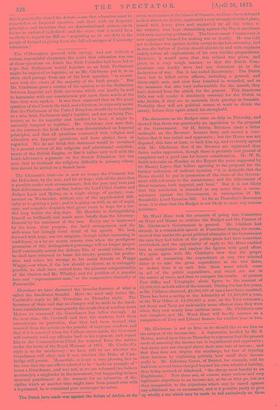The O'Donoghue pressed with energy, and not without a certain
reproachful eloquence, the point that education was one of those questions on which the Irish Catholics had been led to hope that Parliament would legislate as an Irish Parliament might be expected to legislate, or as Mr. Gladstone put it, in an often cited passage from one of his Irish speeches, "in accord- ance with the views of the majority of the Irish people." But Mr. Gladstone gave a version of his opinion as to the distinction between Imperial and Irish questions which can hardly be said to harmonise with any construction put upon these words at the time they were spoken. It was then supposed that on the great question of the Church, the land, and education, he expressly meant that the Parliament of the United Kingdom should try to legislate as a wise Irish Parliament might legislate, and not, as being Pro- testant as to its majority and landlord to boot, it might be naturally tempted to legislate. Mr. Gladstone now says that, on the contrary, the Irish Church was disestablished on Imperial principles, and that all questions connected with religion and education are Imperial questions, and have always been so regarded. We do not think this statement would be sustained by a general review of the religious and educational establish- ments of the British Empire, or that it tallies very well with the Lord-Advocate's argument on the Scotch Education Act last year, that in Scotland the religious difficulty in primary educa- tion should be settled on a Scotch basis.


































 Previous page
Previous page